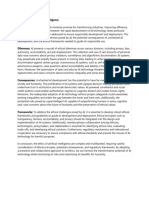0% found this document useful (0 votes)
11 views1 pageScribd Document 2
The document discusses the ethical implications of Artificial Intelligence (AI) in modern society, highlighting concerns such as algorithmic bias and privacy issues. It emphasizes the need for inclusive design and regulation involving ethicists and affected communities to ensure AI serves humanity fairly. Ultimately, the future of AI should prioritize empathy and justice alongside innovation.
Uploaded by
rezaalmanda27Copyright
© © All Rights Reserved
We take content rights seriously. If you suspect this is your content, claim it here.
Available Formats
Download as PDF, TXT or read online on Scribd
0% found this document useful (0 votes)
11 views1 pageScribd Document 2
The document discusses the ethical implications of Artificial Intelligence (AI) in modern society, highlighting concerns such as algorithmic bias and privacy issues. It emphasizes the need for inclusive design and regulation involving ethicists and affected communities to ensure AI serves humanity fairly. Ultimately, the future of AI should prioritize empathy and justice alongside innovation.
Uploaded by
rezaalmanda27Copyright
© © All Rights Reserved
We take content rights seriously. If you suspect this is your content, claim it here.
Available Formats
Download as PDF, TXT or read online on Scribd
/ 1
































































